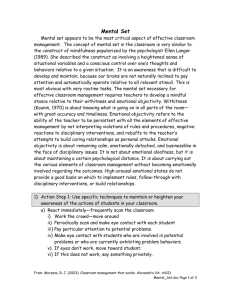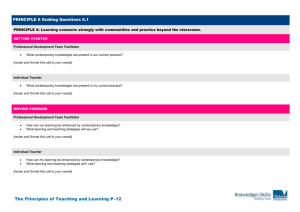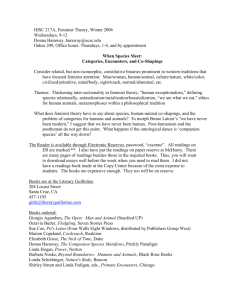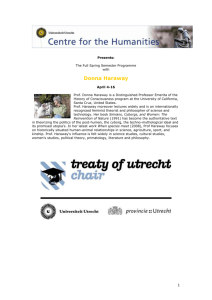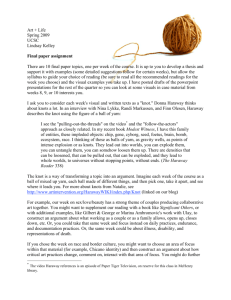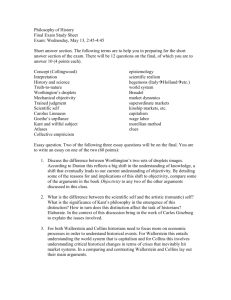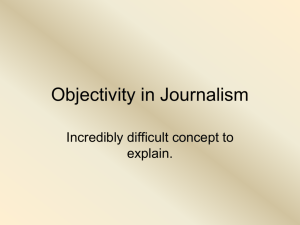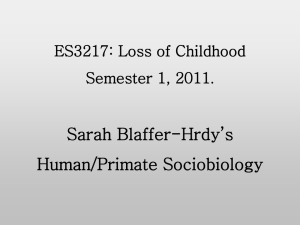Situated Knowledges
advertisement
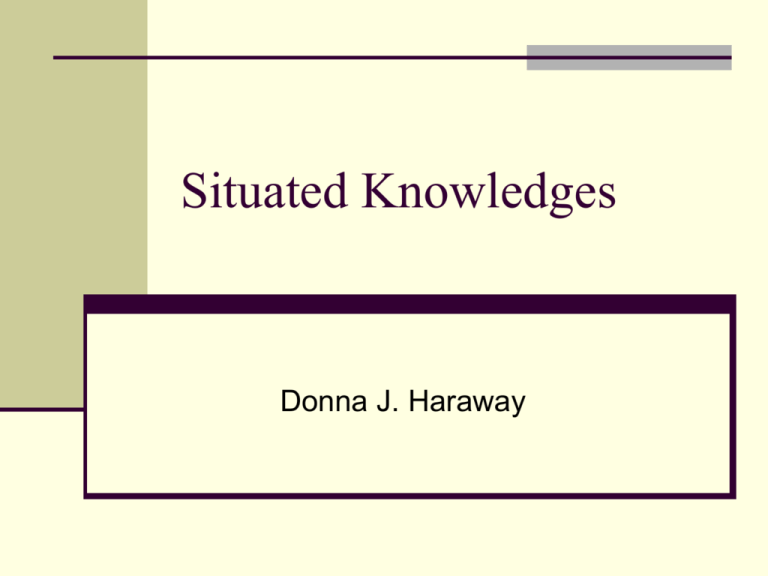
Situated Knowledges Donna J. Haraway Terms and concepts 1: what is objectivity? Common sensical definition: how would you define objectivity? Science vs. humanities argument: What ‘they’ mean by objectivity: „the imagined ‘they’ constitute an invisible conspiracy of masculinist scientists and philosophers” ‘We’ are the embodied others, who are not allowed not to have a body, a finite point of view (going back to Simone de Beauvoir’s definition of woman as the other). To put it simply: scientists determine what is objective, what counts as knowledge. This is not a new problem; Shelley, „A Defence of Poetry”, famous syaing: „poets are the unacknowledged legislators of the world” Terms and concepts 2: constructionism Constructivism vs. essentialism debate in gender studies: essential feminine voice (French feminism: Julia Kristeva, Heléne Cixous) vs. as the term „gender” itself suggests: the feminine is constructed on the basis of social conventions Simone de Beauvoir: „One is not born but becomes a woman. [. . .] It is civilization that produces this creature. She is defined and differentiated with reference to man, and not he with reference to her; she is the inessential, the incidental as opposed to the essential. He is the Subject, the Absolute – she is the Other.” (The Second Sex, 1949.) What are the dangers involved in taking this position? Haraway: „recent social studies of science and technology have made available a very strong social constructivist argument for all forms of knowledge claims, most certainly and especially scientific ones”. Danger: this can lead to cynical relativism. Haraway’s criticism 1: relativism She uses an ironical language: „then came the law of the father and its resolution of the problem of objectivity, solved by always already absent referents, deferred signifieds, split subjects, and the endless play of signifiers” - which approaches is she referring to here? Not just the constructivist approach in gender studies! Her argument: „social constructionism cannot be allowed to decay into the radiant emanations of cynicism” The consequence is absurd: „History is a story Western culture buffs tell each other; science is a contestable text and a power field; the content is the form” (I.e., Derrida, Roland Barthes, Hayden White: the argument that history is a narrative construct, not an objective account of facts) Haraway’s criticism 2: reality A central issue in the humanities and social sciences; no longer taken for granted; seen as constructed, unaccountable Haraway is critical of the concept of the real too, yet she also questions the way radical constructivist theories think of it: we „would still like to talk about reality with more confidence than we allow the Christian right’s discussion of the Second Coming and their being raptured out of the final destruction of the world”; why does she use this particular example? Haraway’s criticism 3: knowledge and facts She is also critical of the changes new approaces lead to in education: „We unmasked the doctrines of objectivity because they threatened our budding sense of collective historical subjectivity and agency and our ‘embodied’ accounts of truth, and we ended up with one more excuse for not learning any post-Newtonian physics” why do social constructivist approaches lead to not taking knowledge and facts seriously? Haraway’s agenda 1: a network connections She does not simply aim to criticise existing modes of knowledge and accounts of the world; she argues that feminists need new modes of knowledge: „Feminists have to insist on a better account of the world; it is not enough to show radical historical contingency and modes of construction for everything” Her thesis: „we do need an earth-wide network of connections, including the ability partially to translate knowledges among very different – and powerdifferentiated – communities”. Why are connections so vital for feminist objectivity? Situated knowledges Her definition of objectivity on page 188: „feminist objectivity means quite simply situated knowledges”. What does situated knowledges mean? 1. embodied, localised. „objectivity turns out to be about particular and specific embodiment, and definitely not about the false vision of promising transcendence of all limits of responsibility”. Can you think about an example of ‘transcendental’ knowledge claims? 2. shared, connected. The alternative to relativism is partial, locatable, critical knowledges sustaining the possibility pf webs of connections called solidarity in politics and shared conversation in epistemology” Some other useful terms Interpret the following terms: 1. „God-trick” of universalism 2. Non-innocent knowledge 3. Partial perspective 4. Local knowledges 5. Essentialised image of The Third World Woman 6. Self-reflexivity In practice: the questions one should ask before presenting a story How to see? Where to see from? What limits to vision? What to see for? Whom to see with? Who gets to have more than one point of view? Who gets blinkered? Who wears blinkers? Who interprets the visual field? What other sensory powers do we wish to cultivate besides vision? Why do we need to ask these questions? What happens if we do not? Groupwork Using Haraway’s theory for the study of the media: How would you construct a media text (news report, film, documentary, etc.) about any historical or social event? What would you do to try to remain as objective as possible? Think about a concrete example!
